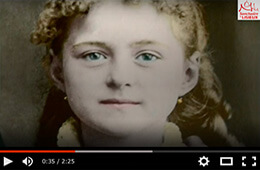

Homily by Father Emmanuel Schwab
5rd Sunday During the Year – Year B
1st reading: Job 7,1-4.6-7
Psalm: 146 (147a), 1.3, 4-5, 6-7
2rd reading: 1 Corinthians 9,16-19.22-23
Gospel: Mark 1,29-39
Click here to download and print the text
The Bible contains two Books in which the suffering of man, even the despair of man, is expressed more than elsewhere: these are the book of Ecclesiastes and the book of Job, of which we heard an extract ago. a moment. “Truly, man's life on earth is a chore... I only share nothingness, I only count nights of suffering... My eyes will no longer see happiness.” Many people can experience this despair. Perhaps some of us are in this state of mind at the moment? The trials of life — and Job experiences many of them! — are sometimes too heavy to carry and it seems to us that life is not worth living.
Our world which has lost sight of the mystery of the Creator, of the one who gives life, our contemporary world thinks that, when the suffering is too great, it is better to kill the person, that it is good. It takes the courage of hope to bear suffering and to continue to affirm that life is worth living
Very early on, Thérèse experiences this world as if it were an exile. It's a word that comes up very often: the expression “this land of exile” to talk about the time in which we live comes up frequently under his pen. For her, the true Homeland is Heaven, and we are here in exile. — This is what the Church sings in the field of Hello Regina, where we call ourselves the exiled sons of Eve: éxules fílii Hévæ. — But at the end of her life, in her last words which her sisters took on the fly, Sister Marie of the Trinity noted this (Thérèse is in her last days):
Life is not sad! On the contrary, she is very cheerful. If you said: “Exile is sad”, I would understand you. We make a mistake in giving the name life to that which must end. It is only to things in heaven, to that which must never die, that we should give this true name; and, as such, life is not sad, but cheerful, very cheerful!… What a beautiful distinction! Life is not sad! On the contrary, she is very cheerful. The exile we are in means that we do not enjoy fullness and life. And when a young man asks Jesus: What must be done to obtain this real life? (Mk 10,17:XNUMX) — In evangelical language, the question is: what must I do to inherit eternal life? — But what this man is looking for is real life! Jesus does not answer him: Die and you will have true life. He did not say to him: End your life and you will have true life... He said to him: Observe the commandments, detach yourself from everything and follow me. The path to true life, brothers and sisters, is Jesus. The path to true life is Jesus. And Thérèse says it in another place; in a letter to her sister, Mother Agnès, she writes:
Oh ! that the earth is exile!… There is no support to seek outside of Jesus because He alone is immutable.
This is somewhat similar to what we call the motto of the Carthusians: Stat Crux dum volvitur orbis – the cross remains while the world turns.
And Thérèse continues:
What joy to think that he cannot change… What joy for our hearts to think that our little family loves Jesus so tenderly.
And a little further.
Ask Jesus that the least, that the last, may not be the last to love him with all his power to love!…
(LT 104 to Mother Agnès May 5-6, 90)
By understanding how Jesus is what is stable, immutable, and how knowing Jesus allows us to go through this exile, this land of exile and the trials of life, Thérèse at the same time has the desire that everyone knows Jesus and in particular the smaller. And we know that she enters Carmel for poor sinners, to win souls to Jesus, that is to say so that all can invoke the name of Jesus.
This is what Jesus does: “Let us go elsewhere, to the neighboring villages, so that there too I may proclaim the Gospel; for that is why I came out. » “This is why I left Capernaum this morning”… but let’s go further: “This is why I left Heaven to come to earth, to this land of exile, to proclaim the Gospel, that is to say, to bring salvation to men. »
This is also why Paul will cry out: “Woe to me if I did not proclaim the Gospel! I don't do it on my own, it's a mission entrusted to me.
My merit is to announce the Gospel without seeking any material advantage, and without asserting my rights as a preacher of the Gospel..
Yes, it passes the figure of this world. We are indeed in a land of exile. We are made for Heaven, for life with God at the heart of the Holy Trinity. And we have to love this life which is already present through the mystery of Christ, this life which, I was going to say, flows in our veins through baptism and particularly through the Eucharist. We are in this land of exile, having within us the power of the life of Heaven, and this is what we must hold on to firmly. We sometimes forget too often that Thérèse is a Carmelite and what characterizes the life of Carmel even today are these two hours of silent prayer - one hour in the morning, one hour at the end of the day - where the sons and daughters of Carmel, men and women alike, take the time to stop in silence and stand in the presence of God to welcome this love of God, welcome this presence of Jesus and meditate on the word of God. In this, they are only imitating Jesus. You heard it in the gospel, it is verse 35 of the first chapter of Saint Mark: “ The next day, Jesus got up well before dawn. He went out and went to a deserted place, and there he prayed.” I think that this mention is not anecdotal so that we are given an anecdote from the life of Jesus. As Pope Francis would say, using a “bad word”: the life of Jesus is paradigmatic — in simpler French, she is a model for us. And when we are told that Jesus gets up well before dawn to go and pray, it is to invite us ourselves to get up well before dawn to go and pray, to imitate the Lord. Jesus, in his humanity, lives this need to devote time to his relationship with the Father, to listening to the Father in the silence of the earth. In this land of exile, to be able to touch Heaven. We are neither Carmelites nor Carmelites, I understand that clearly, but being disciples of Jesus, baptized, confirmed I hope, having received the fullness of the gift of the Holy Spirit, we need to take daily time to silence to stand in the presence of the Lord, taste his love and listen to his word.
This is how our lives can gradually be converted.
This is how charity and hope can gradually inhabit our hearts, through the faith that we seek to live.
And this is how our lives will announce the Gospel… not first of all through our awareness of it; but if we live this land of exile with its trials in the logic of Heaven and in the joy of Heaven, then our lives themselves will proclaim the Gospel of the Lord to our world.
Amen


 Video gallery
Video gallery  Souvenirs and prayer supports
Souvenirs and prayer supports  Lisieux Tourist Office
Lisieux Tourist Office 
